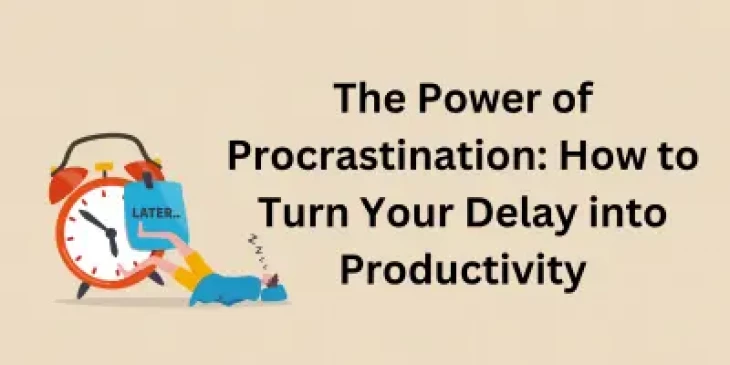The age-old enemy of understudies all over. We've all been there—putting off assignments until the final minute, postponing consider sessions, and surrendering to the allure of diversions. But what on the off chance that procrastination wasn't continuously the enemy? What if, with the proper approach, we might tackle its control to boost efficiency and imagination?
In this web journal, we'll look into the interesting marvel of delaying and how it can be reframed as an instrument for victory. Instead of seeing procrastination as an obstruction to efficiency, we'll reveal techniques for leveraging it to our advantage. From understanding the brain research behind delaying to executing effective time management methods, we'll dig into significant tips and experiences that understudies can apply to their possess lives.
So, let's roll into it!

1. The Psychology of Procrastination:
We'll jump into the reasons why we hesitate, investigating concepts like fear of disappointment, perfectionism, and the charm of moment satisfaction. Understanding the basic psychological variables can offer assistance to understudies in recognizing their claim-delaying designs and creating methodologies to overcome them.
Imagine a student, Sarah, who reliably procrastinates on beginning her term paper. Despite having sufficient time to work on it, she finds herself maintaining a strategic distance from the assignment, fearing that she won't meet her high guidelines. As a result, she procrastinates by locking in exercises like looking over through social media or cleaning her room. By understanding that her procrastination is driven by perfectionism and fear of disappointment, Sarah can start to address these fundamental issues and create procedures to overcome them.
2. Procrastination as a Creative Catalyst:
Opposite to well-known belief, delaying isn't continuously a waste of time. We'll investigate how taking breaks and permitting our minds to wander can improve imagination and problem-solving aptitudes. By grasping minutes of delay as openings for reflection and motivation, understudies can open their creative potential.
Consider an understudy, John, who is battling to come up with thoughts for his art project. Rather than driving himself to work on it non-stop, John chooses to take a break and go for a walk in nature. Amid his walk, he permits his mind to imagine, taking within the sights and sounds around him. All of a sudden, motivation strikes, and John comes up with a brilliant concept for his project. By grasping minutes of delay as openings for creative exploration, John can tap into his creative energy and deliver his best work.
3. Turning Delaying into Productivity:
We'll give commonsense tips and methods for overseeing delaying and remaining centered on assignments. From breaking projects into smaller, more manageable steps to setting practical due dates and utilizing efficiency devices, understudies will learn how to channel their delaying inclinations into beneficial activity.
Presently, let's look at an understudy, Emily, who tends to procrastinate on considering exams. Rather than attempting to kill delaying completely, Emily chooses to work with it by actualizing the Pomodoro Strategy. She sets a clock for 25 minutes and commits to considering for that period, taken after by a 5-minute break. During her breaks, Emily permits herself to enjoy activities she appreciates, like tuning in to music or taking a fast walk. By breaking her thoughts about sessions into smaller, more manageable chunks, Emily can remain centered and productive while still permitting minutes of procrastination.
4. Embracing Flaws:
Perfectionism may be a common driver of procrastination, as students may avoid beginning assignments out of fear of not meeting high guidelines. We'll talk about the significance of embracing flaws and adopting a development mentality, permitting students to overcome perfectionism and take action despite their fears.
Imagine a student, David, who battles with perfectionism when it comes to his writing assignments. He spends hours agonizing over each word, anxious to begin until he feels certain that it'll be idealized. As a result, he frequently procrastinates on beginning his assignments until the last minute, causing pointless stress and uneasiness. To overcome his perfectionism, David decides to embrace a development mentality. He reminds himself that it's affirm to create mistakes and each draft is an opportunity to memorize and move forward. By embracing flaws and centering on progress instead of perfection, David can overcome his procrastination tendencies and deliver his best work.
Hesitation doesn't have to be the enemy—it can be a powerful ally in our journey for efficiency and imagination. By understanding the brain research behind procrastination and actualizing successful methodologies for overseeing it, understudies can tackle its control to their advantage. So, the following time you discover yourself procrastinating, keep in mind: that with the correct approach, procrastination can be a pathway to victory.
We are here to help you out. Feel free to tap your views and doubts to us and our counselors will get in touch with you. Happy Studying!



Leave a Comment
To post comment, please